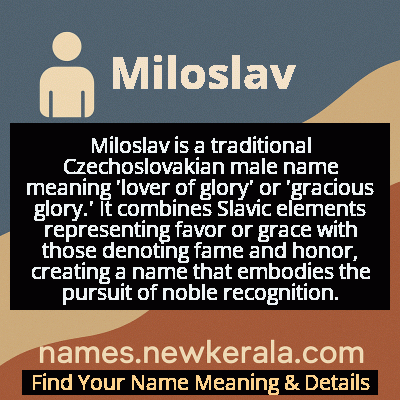Miloslav Name Meaning & Details
Origin, Popularity, Numerology Analysis & Name Meaning of Miloslav
Discover the origin, meaning, and cultural significance of the name MILOSLAV. Delve into its historical roots and explore the lasting impact it has had on communities and traditions.
Name
Miloslav
Gender
Male
Origin
Czechoslovakian
Lucky Number
4
Meaning of the Name - Miloslav
Miloslav is a traditional Czechoslovakian male name meaning 'lover of glory' or 'gracious glory.' It combines Slavic elements representing favor or grace with those denoting fame and honor, creating a name that embodies the pursuit of noble recognition.
Miloslav - Complete Numerology Analysis
Your Numerology Number
Based on Pythagorean Numerology System
Ruling Planet
Uranus (Rahu)
Positive Nature
Strong sense of order, loyal, practical, and disciplined.
Negative Traits
Stubborn, overly serious, rigid, and prone to feeling restricted.
Lucky Colours
Blue, gray.
Lucky Days
Saturday.
Lucky Stones
Blue sapphire.
Harmony Numbers
1, 7, 8.
Best Suited Professions
Managers, engineers, accountants, organizers.
What People Like About You
Dependability, discipline, practicality.
Famous People Named Miloslav
Miloslav Kříž
Basketball coach
Legendary Czechoslovak basketball coach who led the national team to multiple European Championship medals
Miloslav Vlk
Cardinal
Czech Roman Catholic cardinal who served as Archbishop of Prague and was known for his role in post-communist religious revival
Miloslav Šimek
Actor and comedian
Influential Czech comedian, actor, and writer known for his partnership with Jiří Grossmann and popular television shows
Miloslav Ransdorf
Politician
Czech politician and Member of European Parliament, known for his intellectual contributions to left-wing politics
Name Variations & International Equivalents
Click on blue names to explore their detailed meanings. Gray names with will be available soon.
Cultural & Historical Significance
The name's components - 'milo' (grace/favor) and 'slav' (glory) - represent core Slavic virtues that have been celebrated in folklore, literature, and historical narratives, making Miloslav more than just a personal identifier but a symbol of cultural resilience and national character. In modern contexts, the name continues to carry these cultural associations, serving as a link to ancestral traditions while adapting to contemporary society. The preservation and continued use of names like Miloslav demonstrate the enduring strength of Slavic cultural identity in Central Europe.
Extended Personality Analysis
Individuals named Miloslav are typically perceived as possessing a strong sense of honor and dignity, often driven by a desire to achieve recognition through meaningful accomplishments rather than superficial success. They tend to be principled, reliable, and deeply connected to their cultural roots, displaying a natural leadership quality that inspires confidence in others. The 'glory-loving' aspect of the name manifests as ambition tempered by ethical considerations, leading them to pursue excellence in their chosen fields while maintaining strong moral compass.
Miloslavs are often characterized by their intellectual curiosity, perseverance, and ability to balance traditional values with modern perspectives. They typically exhibit a warm yet reserved demeanor, forming deep, lasting relationships rather than numerous superficial connections, and are known for their loyalty to family and community. Their pursuit of glory is not for personal aggrandizement but rather for contributing to something larger than themselves, whether in professional achievements, artistic creations, or community service. This combination of ambition and integrity makes them respected figures in their social and professional circles.
Modern Usage & Popularity
In contemporary times, Miloslav maintains a respectable presence in Czech and Slovak naming traditions, though its popularity has evolved with changing trends. While not among the most common names for newborns in recent decades, it retains a classic, distinguished status often chosen by parents seeking to honor family traditions or express cultural pride. The name is particularly prevalent among middle-aged and older generations, reflecting its peak popularity in the mid-20th century. Recent years have seen a mild resurgence of interest in traditional Slavic names, including Miloslav, as younger generations rediscover their cultural heritage. The shortened form 'Miloš' is more commonly used in everyday contexts, providing a modern, accessible alternative while preserving the name's traditional roots. Internationally, the name gains recognition through successful Czech and Slovak expatriates, helping to maintain its relevance across generations.
Symbolic & Spiritual Meanings
Symbolically, Miloslav represents the harmonious union of grace and honor, embodying the ideal of achieving glory through virtuous means rather than mere ambition. The name carries connotations of cultural continuity, serving as a living connection to Slavic traditions and historical narratives. It symbolizes the pursuit of excellence that benefits the community rather than just the individual, reflecting collectivist values deeply embedded in Slavic cultures. The combination of 'milo' (suggesting kindness, favor, or grace) with 'slav' (glory, fame) creates a powerful metaphor for earned recognition - the idea that true glory comes not from seeking attention but from acting with integrity and compassion. This symbolic meaning extends to representing resilience and cultural pride, particularly in contexts where Slavic identities have faced historical challenges or suppression.

